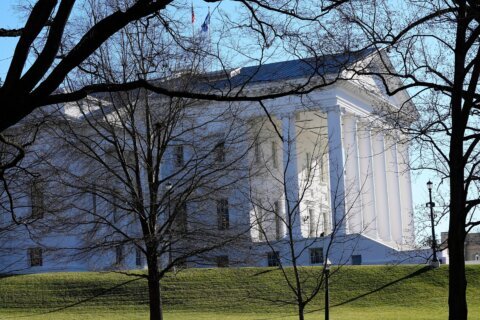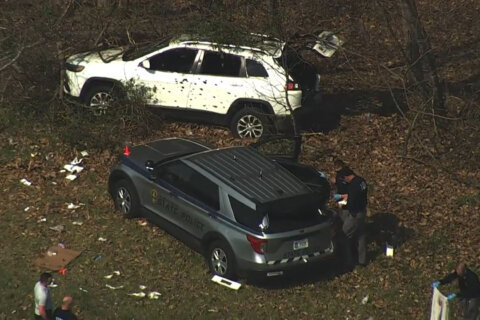This article was republished with permission from WTOP’s news partner InsideNoVa.com. Sign up for InsideNoVa.com’s free email subscription today.
This article was written by WTOP’s news partner InsideNoVa.com and republished with permission. Sign up for InsideNoVa.com’s free email subscription today.
Prince William County officials are considering changing public comment procedures at Board of Supervisors meetings.
Board Chair Ann Wheeler recently voiced concerns about the structure of public input as residents this year have frequently stretched the length of public meetings.
Public comment was more limited in 2020 because of the COVID-19 pandemic, but gradually became more robust throughout 2021. In the past year, it has primarily been driven by those supporting or opposing the PW Digital Gateway.
The project, which proposes 27.6 million square feet of data centers on 2,100 acres along Pageland Lane, has quickly become the most controversial and contentious local land-use proposal in decades.
Opponents and proponents have launched personal attacks against each other, and it has spawned recall efforts against Gainesville Supervisor Pete Candland and Wheeler and a federal lawsuit against Candland.
State law does not require local governments to hold public comment sessions, although legislators have periodically tried unsuccessfully to change the law.
The Board of County Supervisors meetings are typically broken into two parts at 2 p.m. and 7:30 p.m., with public comment allowed at both sections. Speakers are allowed three minutes each and can sign up for both sessions.
Long-running meetings on the rise
A review of board meetings by InsideNoVa found that in the past 20 months, the board has held 76 public comment sessions. They ranged from four minutes each on Oct. 5 and Oct. 12, 2021, to a long of 3 hours and 13 minutes on July 20, 2021.
In 2021, public comment was held 48 times with an average length of 43 minutes. Of those, 18 public comment sessions took less than 30 minutes and 37 lasted less than an hour. Eleven sessions lasted more than an hour, and only three were more than two hours.
However, so far in 2022, 28 sessions have been held, and only one public comment period was less than 30 minutes and only six were less than an hour. Twenty-two lasted more than an hour and four were more than two hours.
The average in 2022 so far is 1 hour and 25 minutes per public comment session, with the quickest being 25 minutes in the evening on Jan. 18.
The longest this year was in an afternoon meeting on Aug. 2: 2 hours and 46 minutes. The board had only an afternoon session planned that day so members could participate in National Night Out activities, but supervisors missed the event partly because of the length of public comment.
Combining afternoon and evening sessions since January 2021, aggregate public comment has exceeded two hours on 15 occasions, with 11 of those in 2022.
Supervisor Kenny Boddye, D-Occoquan, said public comment is “an important fixture” in board meetings, and he supports “allowing it in many forms to be as accessible as possible.”
While Boddye believes that “every resident who wants to have a voice in shaping our community should have that opportunity,” he’s “not sure that our current public comment procedures achieve this goal.”
“Are we best serving the public when meetings regularly stretch late into the night?” he said. “I’m open to procedural changes that maintain the public’s direct line to the Board of Supervisors while also enabling us to conduct the people’s business in a more efficient manner, and also shows respect for the time of folks participating in public hearings.”
Supervisor Victor Angry, D-Neabsco, said the length of public comment over the past year has placed a burden on those who have specific business before the board.
Particularly on land-use cases, Angry said if meetings stretch late into the night, it could require developers or business owners to spend more to pay for their legal representation.
Angry said public comment sessions should be capped at two hours. He also plans to conduct his own public comment sessions on Mondays prior to board meetings.
“There is a clear issue with what is currently happening at board meetings,” he said. “Citizens are upset if we move those conducting county business before them, and those conducting business often are waiting past midnight to conduct their business.”
Supervisors rarely provide any sort of direct response during public comment and frequently have to endure personal attacks in silence.
Supervisor Yesli Vega, R-Coles, noted she has been one of the more frequent targets of partisan attacks. “I’ve clearly been on the receiving end of the most vitriolic hatred that any board member has had thrown at them by left-wing activists.”
However, Vega doesn’t support any proposal “to limit public comment time in any way.”
“The answer isn’t to limit speech and the First Amendment opportunities of our residents,” she said. “If the Chair doesn’t want super long meetings, perhaps she should put a pause on pursuing her personal and political agenda, which has proven to be very divisive – hence the reason why our residents feel like they have to come out every week to petition their government.”
Vega doesn’t believe the length of public comment places a burden on those with business before the board because they “eventually get heard.”
“[O]ur taxpayers are the ultimate group with business before the board,” she said. “The solution isn’t to place them in line behind the special interests.”
What do other localities do?
Prince William is the only Northern Virginia county without limits on either the number of speakers at public comment or a cap on total time for public comment. The county’s rules only prevent speakers from discussing something already scheduled for a public hearing that day and prohibit “the use of obscenity or other speech tending to create a breach of the peace.”
In comparison, Fairfax County limits its public comment to 10 speakers per session, and residents can speak only once per six-month period. Speakers are barred from discussing “issues under litigation; issues that have been scheduled for public hearing before the Board; and personnel matters or comments regarding individuals.”
Loudoun County’s rules vary depending on the time of the month. At its first Tuesday meeting, public input is allowed at 6 p.m. and capped at 90 minutes. At its meeting on the third Tuesday, it allows eight speakers limited to 2½ minutes each at 5 p.m. Then, at 6 p.m., public comment is open but capped at 90 minutes.
Arlington County has some of the most stringent rules in Northern Virginia. It holds public comment at 8:30 a.m. during Saturday meetings and limits speakers to two minutes. The county board allows only one speaker on “each topic, but opposing views on the same topic will be considered two different topics.”
At the Aug. 2 meeting, Wheeler mentioned Arlington’s procedures and said she plans to discuss changes to public comment heading into the fall. She floated the idea of a dedicated day for public comment, saying the county had received nearly 800 public comment speaking requests in the past six months.
“Coming back in the fall, because we are trying to get the business of the county done … I’m going to talk to my colleagues about trying to make some changes about how we handle public comment time,” she said.
At a meeting on Feb. 9, 2021, speaking before the evening portion of the meeting started 35 minutes behind schedule, Wheeler laid some of the blame on the board itself.
“It’s only the fault of our own board that we take so long in these meetings,” she said. “I’m just putting us on record that perhaps it shouldn’t have taken so long to get through some of the things that we got through today and I think we need to be cognisant of the fact that we do have an evening session when we’re going through and hearing things in the afternoon.”
One area supervisors might look on the agenda to save time is the time it takes to clear the consent agenda, which comes before public comment in the afternoon sessions.
That part of the meetings, however, only averages 26 minutes to clear and was less than 10 minutes on six occasions. The longest time supervisors have taken to clear the consent agenda was an hour and 12 minutes on March 2, 2021.
Another area on the agenda the board could consider is supervisors’ time, which gives each supervisor five minutes to discuss topics in their districts, highlight events they have attended or suggest actions not otherwise on the agenda.
With eight supervisors, that section of the agenda should last about 40 minutes, but averages only 37 minutes. The quickest supervisors’ time was 12 minutes on April 12, and the longest was 1 hour and 38 minutes on June 15, 2021.
Wheeler and supervisors Margaret Franklin, Jeanine Lawson, Pete Candland and Andrea Bailey did not return multiple requests for comment.







